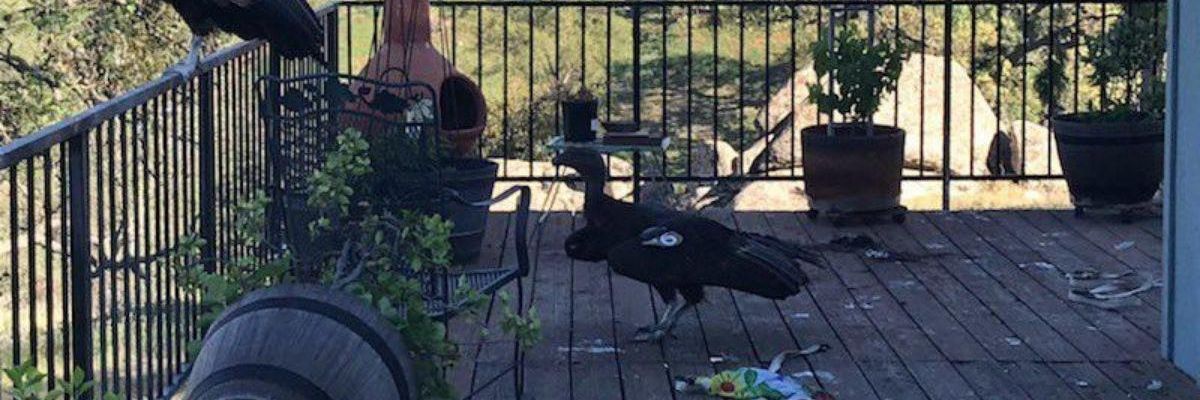
Most people would count themselves lucky to have a sighting of more than a dozen endangered animals out their front window when there aren’t very many of the creatures living in the wild. Such a one-in-a-million kind of opportunities don’t come around every day.
But for a California woman whose deck a group of 15 or so endangered California condors chose as a roosting spot, “lucky” isn’t exactly the right sentiment.
Twitter user Seana Lyn shared photos of the giant birds and the havoc they are wreaking on her mom’s house.
“Over the weekend ~15 California condors descended on my mom’s house and absolutely trashed her deck,” she wrote. “They still haven’t left. It sucks but also this is unheard of, there’s only 160 of these birds flying free in the state and a flock of them decided to start a war with my mom.”
Over the weekend ~15 California condors descended on my moms house and absolutely trashed her deck. They still have… https://t.co/3SVB9Xr1rH
— Seana Lyn (@SeanaLyn)
1620176081.0
The photos show the gigantic birds boasting colored tags with numbers on them, which is how the U.S. Fish and Wildlife Service track which breeding program they belong to.

Seana Lyn on Twitter
twitter.com
You can also see how they’ve knocked over planters and pooped everywhere.

And also how they’ve torn off and torn apart covers for items on the deck—and pooped and pooped some more.
California condors have a wingspan that ranges from 8 feet to nearly 10 feet, and they weigh an average of 18 to 20 pounds. These are not small birds, and when you get 15 or so of them together, the damage they can do is formidable.
Happy Mother’s Day mom, hope you like the condors 😂😭
— Seana Lyn (@SeanaLyn)
1620184141.0
Seana’s mom, to her credit, thinks the whole thing is “pretty amazing but also the worst.” That about sums it up.
Checked in with mom, they’re still hanging out ominously on one of her trees but thankfully are not on the house at… https://t.co/OiW3EiyUsM
— Seana Lyn (@SeanaLyn)
1620236234.0
The condors did move to the trees nearby so they at least weren’t using the house as their personal bathroom, and then circled overhead. “Fingers crossed they’re enjoying the neighborhood but being good neighbors now,” wrote Seana Lyn.
Update after being MIA for half the day mom said that they have returned and now theyre circling overhead. Haven’t… https://t.co/yD51lzrqu0
— Seana Lyn (@SeanaLyn)
1620255507.0
“Still wild to me that in my lifetime there went from being about 25 condors left alive to no almost that many descending on my mom’s house at once,” she added. “Makes me wonder if we will start seeing more giant flocks as their numbers rise.”
Good morning to everyone especially my mom who gave these two condors on her roof a “shower” this morning with a ho… https://t.co/G3554B3liO
— Seana Lyn (@SeanaLyn)
1620317558.0
The U.S. Fish and Wildlife Service weighed in on the matter on Twitter, writing, “Hi @SeanaLyn, her home is located in historical condor habitat where natural food sources occur…unfortunately they sometimes perceive houses and decks as suitable perch locations.
“If this happens again, hazing to preclude them from causing damage and habituation is encouraged. This includes methods that will not harm them such as water hoses, yelling, clapping, shouting or using other preventative measures such as scarecrow sprinklers.”
They also said they don’t encourage people to touch the birds. (Who on earth would approach a ginormous California condor and try to touch it??? Oh, right. Lots of people, probably.)
@SeanaLyn If this happens again, hazing to preclude them from causing damage and habituation is encouraged. This in… https://t.co/Vbc1TNg2bv
— U.S. Fish and Wildlife (@USFWS)
1620239068.0
While an endangered animal encounter is indeed pretty amazing, this wasn’t the kind of encounter anyone wants to have, so Seana’s mom was undoubtedly glad to hear she could do a little condor “hazing” if need be. She did end up hosing two condors off of her roof, moving them into a nearby tree with their buddies.
The saving of the California condor is one of the great endangered species success stories. Their numbers dwindled to a couple of dozen in the 1980s, when wildlife conservationists gathered up those that were left to start an intense breeding program to bring them back from the brink of extinction. Now there are more than 300 California condors living in the wild and more than 500 total including those in captivity and breeding programs.
Trashing a human’s house is a heck of a way to say “thanks for saving our species,” birdies. (Then again, since their near-extinction was kind of our fault, I guess we have to look past it.) Maybe just leave the nice lady’s porch alone and go find some nasty politician’s home to poop on. That would be a win-win all around.
